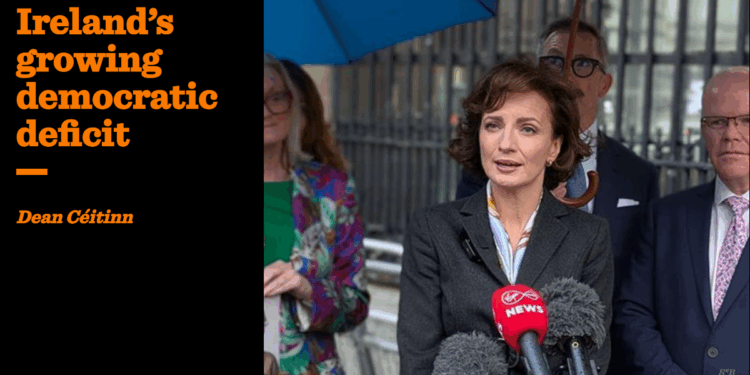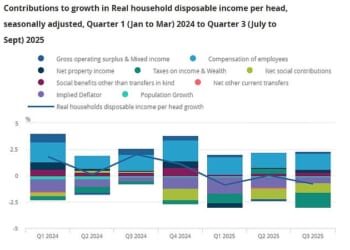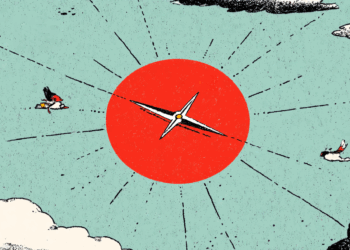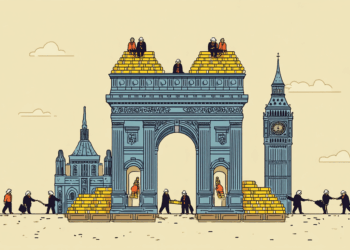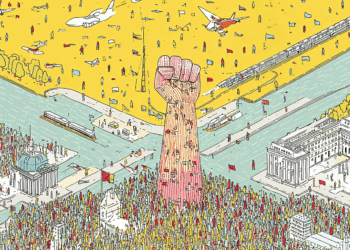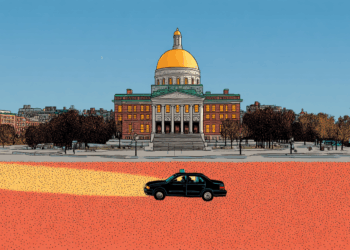There’s an adage that Ireland is 20 years behind the rest of Europe and America — that the political and cultural trends that dominate the rest of the West will eventually be reflected in Ireland, albeit at a slight delay. Recently, I’ve heard this concept be employed to explain Ireland’s exceptionalism to the growth of the populist right. Unlike the rest of Europe, the left in Ireland has not seen a decline, there is no nascent right. While the candidates for Ireland’s upcoming presidential election reflect this electoral landscape — two candidates from the centrist governing parties, and a left unity candidate — they do not reflect public mood.
A sizeable section of the electorate … remains almost entirely uncatered for in Ireland’s electoral landscape
Polling suggests that nearly two-thirds of the population want a more restrictive immigration policy, while one-third say they would consider voting for an anti-immigration party. Similarly, the referenda on abortion and same-sex marriage suggest that roughly one-third of the population hold socially conservative views. As Dr. Matt Tracey noted, around 14 per cent of all votes in the most recent general election could be interpreted as being cast against the liberal consensus. Moreover, last year’s defeat of the referendum to remove references to women from the Constitution — rejected in every constituency bar the leafy suburbs of south Dublin — indicates a growing rightward shift in public sentiment. However, this is a sizeable section of the electorate that remains almost entirely uncatered for in Ireland’s electoral landscape.
In an effort to ameliorate this, Senator Sharon Keoghan attempted to aid several independent candidates to get on the ballot for the upcoming presidential election. To qualify, a candidate must obtain a nomination from either four county councils or twenty members of the Oireachtas. The greatest obstacle to the local route was the dominance of the two largest parties, Fianna Fáil and Fine Gael, on county councils.
Despite this, the prerogative of councils to nominate a presidential candidate remains one of the last vestiges of power actually held by county councils. With most executive functions of local authorities now transferred to civil servants, Irish councils have almost no autonomy from the central government, and rank the lowest on the European local democracy index. Efforts to improve the state of Irish local democracy have been stifled, over fears that directly elected mayors could result in a Conor McGregor mayoralship.
Perhaps motivated by the same fear of the spectre of McGregor, Fine Gael instructed its councillors not to support independent candidates seeking nomination. While Fianna Fáil did not issue a direct order, the effect was largely the same: only three of Ireland’s local authorities chose to nominate a candidate. For the first time since 1990, no candidate reached the ballot through the local nomination route.
In response, Aontú attempted to organise a caucus of minor parties and independents as a pathway to securing a nomination through the Oireachtas. Although the caucus ultimately backed conservative campaigner Maria Steen, it fell short of the 20 participants required to place her on the ballot. This sparked a grassroots effort by conservatives across the country, lobbying independent representatives as well as 70 local councillors signing a letter to independents in the Oireachtas, urging them to nominate Steen.
Key senators whose support was essential for Maria Steen’s nomination ultimately declined to sign her papers. Senator Gerard Craughwell claimed that a Maria Steen fan account, set up by a college student to encourage people to contact their local representatives, was “nothing short of intimidation”. He refused to nominate Steen, arguing that her candidacy would turn the contest into a replay of Ireland’s abortion referendum. Ironically, Senator Craughwell himself had withdrawn from seeking a nomination in the 2018 presidential race, claiming that the main political parties were “working together to deny the citizens of this Republic the opportunity to select their next President by means of an election.”
Senator Michael McDowell, despite having worked with Steen on previous referendums, refused to sign Steen’s papers or even engage with her. While McDowell is yet to provide a reason for this, supporters of McDowell told Gript this was because, “If she were to win, it would have been said that the referendum campaigns launched her as Presidential material. And for Michael that would have been intolerable. In his mind those were his referendums. His win. And she would have gotten retrospective credit for it.”
Surprisingly, there was more interest in nominating Steen from representatives that were aligned with the Government than with McDowell. While independent Deputy Healy-Rae said that he supported the Fine Gael candidate, Heather Humphreys, he signed Steen’s nomination papers so that “the people of Ireland are given a fair and full choice when they go to the polls”. Fianna Fáil TD Willie O’Dea likewise said that he would be open to giving Steen “a chance” but that he would not “go solo”. This didn’t transpire, as another senator claimed “The party wouldn’t let me back her”.
The senator’s claim adds veracity to the image of dissent within the two senior parties being stifled by an authoritarian and top down internal political culture. As former justice Minister Charlie Flanagan, a member of Fine Gael, claimed “I would have more power … as a vociferous NGO than I would have as a government backbencher.” Likewise, neither Sinn Féin or Fianna Fáil allowed for a vote on who the respective parties would nominate.
Catherine Connolly, the left-unity candidate, when asked if she would encourage her backers to facilitate the nomination of Steen to allow for greater choice, refused to do so. This is despite her predecessor, Labour’s Michael D. Higgins, having conversely asked his party colleagues not to block the passage to nomination of David Norris.
Steen ultimately fell short of getting on the ballot by 2 nominations but has highlighted a deepening democratic deficit in Ireland — where local democracy is being suffocated, governing parties block local empowerment out of fear it might benefit their rivals, where internal party dissent is silenced, and one-third of the electorate is denied a candidate who reflects their views. On top of this, Government MEPs have conceded that 70 per cent of Irish laws are now made in Brussels, which itself has questionable democratic mechanisms.
The right wing drift in Ireland has been tangible and people’s frustrations are clear
On October 24th, the presidential election will go ahead. The Irish people have been given the options of a former minister, a former GAA manager whose politics are still unbeknownst to the electorate, and a radical left-unity candidate who recently claimed it was not for Keir Starmer to decide Hamas’ role in a Palestinian state.
This line-up does not reflect the direction of public mood. As Steen herself said: “Rarely has the political consensus seemed more oppressive or detached from the wishes and desires of the public.” Ireland is not 20 years behind Europe or the United States. Anyone who has seen opinion polling or been to the smoking area of a bar knows the right wing drift in Ireland has been tangible and people’s frustrations are clear. By shutting Steen out, Ireland’s political class has sent a clear message to at least one third of the population she may have represented: they are not even welcome in the public conversation.

